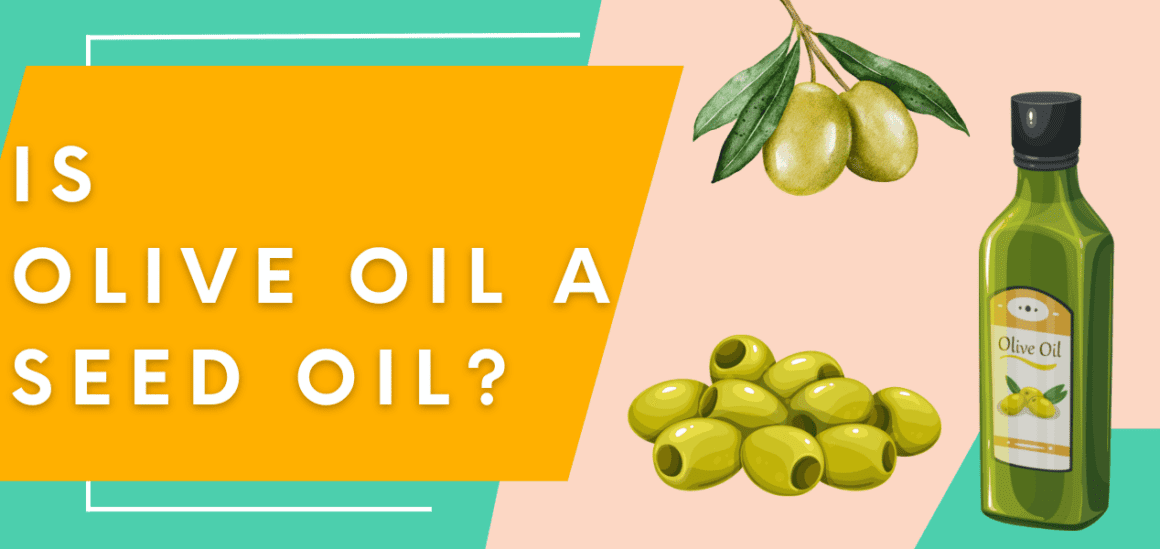Many kitchens would be incomplete without a bottle of olive oil stacked in a cupboard or shelf. Serving both as an excellent finishing touch on dishes and as a healthy superfood, the curious house foodie might wonder, is olive oil a seed oil?
- Is Olive Oil A Seed Oil?
- Olive Oil – What Kind Of Oil Is It?
- Seed Oils vs. Fruit Oils
- Health Benefits of Olive Oil
- Additional FAQs
- What is the difference between seed oil and fruit oil?
- How is olive oil produced, and what makes it different from seed oils?
- What are the health benefits of olive oil compared to seed oils?
- Can olive oil be used as a substitute for seed oils in cooking?
- What are the best ways to incorporate olive oil into a healthy diet?
- Olive Oil vs. Seed Oils
- Conclusion
- Related Posts
Is Olive Oil A Seed Oil?
The fruit is a drupe, which is a type of fruit that has a fleshy outer layer surrounding a hard pit or seed. The oil is extracted from the fleshy part of the fruit, not the seed.
Olive Oil – What Kind Of Oil Is It?
Seed oils are considered vegetable oils, a general term for edible oils sourced from plants. The most common vegetable and seed oils widely used include sunflower, canola, linseed, grapeseed, and sesame.
While olive oil has been popularly considered a seed oil, it’s actually a fruit oil since olives are a fruit, and the oil is sourced from the fruit itself, not the seed.
Different oils fill different needs â for health, taste, and cooking, so it’s important to determine the right oil for you. The body needs a variety of healthy fats found naturally in different oils to achieve an optimal state of health.
Olive Oil – How Is It Harvested
In the United States, olive oil is mostly harvested in California, followed by Arizona, Texas, Georgia, and Florida. But most of the world’s olive oil is produced in Europe, with the province of Jaén, Spain as the largest producer, followed by Tuscany, Italy, and places like Peloponnese and Crete in Greece.
Making olive oil entails five steps:
- Collection
- Washing and pressing
- Kneading
- Extraction
- Separation
Four main factors affect the quality and taste of olive oil: the variety of olives used, the climate, the soil, and the weather; For example, olives grown in dry conditions tend to produce olive oil with a stronger, better quality, while wet conditions can negatively affect it.
Seed Oils vs. Fruit Oils
The main difference between seed oils and fruit oils is that fruit oils are extracted from the contents of the fruit, while seed oils are sourced from a fruit/vegetable’s seeds. Examples of fruit oil include coconut, bergamot, and tangerine.
Composition
Seed oils are composed of polyunsaturated fatty acids (PUFAs), linoleic and linolenic acids, and a-tocopherol.
Fruit oils have varying compositions depending on their source.
For example, olive oils are comprised of triacylglycerols and secondarily free fatty acids, mono- and diacylglycerols, and various lipids.
Health Benefits of Olive Oil
Olive oil is replete with many important health benefits:
- Boost the immune system
- Promotes heart health
- Prevent many types of cancer
- Helps manage the effects of diabetes
- Promotes better mental health
- Prevent cognitive decline
A 2019 study reveals that polyphenols from three different olive oil varieties have an inhibitory effect against several bacterial strains, effectively boosting the immune system. Additional studies have found that olive oil can influence blood glucose at different levels, helping control and prevent diabetes complications, and allowing for higher insulin levels, making it beneficial to people with type 2 diabetes.
â The 4 Olive Oils with the Highest Polyphenol Counts
â Best Olive Oils To Drink Daily
Recent studies show that consuming olive oil protects memory and learning abilities and reduces the buildup of proteins in the brain, which is the cause of Alzheimer’s disease.
Additional FAQs
What is the difference between seed oil and fruit oil?
Fruit oils are extracted from the fruit itself, while seed oils are sourced from seeds.
How is olive oil produced, and what makes it different from seed oils?
Olive oil is harvested physically and mechanically, compared to seed oils, which undergo more chemical processes.
What are the health benefits of olive oil compared to seed oils?
Unlike most seed oils like canola, palm, and soybean, olive oil is richer in healthy monounsaturated fats, minerals, and antioxidants.
Can olive oil be used as a substitute for seed oils in cooking?
Olive oil can substitute seed oils in dressings, marinades, and sautéing ingredients in low -medium heat.
What are the best ways to incorporate olive oil into a healthy diet?
Start using olive oil as a spread, dressing, marinade, or finishing touch in various dishes. But most nutritionists recommend taking it raw to best enjoy its health benefits.Â
Olive Oil vs. Seed Oils
In terms of nutrient properties, olive oils fare much better than seed oils like canola and soybean oils because olive oil has a much higher percentage of minerals and antioxidants. Compared to palm oil, which mainly contains saturated fats that raise cholesterol levels, olive oil is rich in healthy monounsaturated fats.
Olive oils undergo a more natural mechanical harvesting and production process, whereas seed oils use high-temperature chemical processes.
Key Takeaways
- The difference between seed oils and fruit oils is that fruit oils (in this case, olive oils) are extracted from the fruit itself, while seed oils are sourced from seeds.
- Olive oil offers many important health benefits thanks to its composition and properties.
- Olive oils are harvested and produced naturally and physically, whereas seed oils undergo high-temperature chemical processes.
Conclusion
Given that oils fill different needs, knowing the differences between seed oils and olive oils help you determine which suits you best, whether you’re using them to add flavor to your dishes or taking them to boost your health. Although studies show that olive oil fares better than seed oils in terms of nutritional properties.
Always check the labels and brand reputation before settling for an olive oil brand to ensure you get the most out of its benefits.
Disclaimer: this article does not constitute or replace medical advice. If you have an emergency or a serious medical question, please contact a medical professional or call 911 immediately. To see our full medical disclaimer, visit our Terms of Use page.











